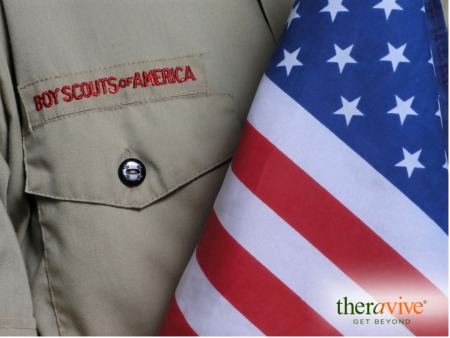 In April 2015 Robert M Gates, the national president of the Boy Scouts of America, addressed his organization at their national business meeting (BSA, 2015). In his speech he raised the thorny issue of gays in the Scouts. The organization had long held in place a ban on atheists, agnostics, and what they call "open or avowed" homosexuals participating as members (BSA, 2012). In 2012, presidential candidates Barack Obama and Mitt Romney both spoke out against the ban on homosexuals. A year later the Scouts National Council approved a resolution removing the restriction on youths. That resolution went into effect at the beginning of last year. The restriction on homosexual adults remains in place.
In April 2015 Robert M Gates, the national president of the Boy Scouts of America, addressed his organization at their national business meeting (BSA, 2015). In his speech he raised the thorny issue of gays in the Scouts. The organization had long held in place a ban on atheists, agnostics, and what they call "open or avowed" homosexuals participating as members (BSA, 2012). In 2012, presidential candidates Barack Obama and Mitt Romney both spoke out against the ban on homosexuals. A year later the Scouts National Council approved a resolution removing the restriction on youths. That resolution went into effect at the beginning of last year. The restriction on homosexual adults remains in place.
History of Their Stance
Mirroring the military, the organization has over the years gone from the explicit policy banning homosexuality to one of something akin to “don't ask don't tell” (BSA, 2015a). Their position statement in 1991 (BSA, 1991) was that "homosexual conduct is inconsistent with the Scout Oath that a Scout be morally straight…clean in word and deed.” Homosexuals were explicitly described as undesirable as role models. Two years later the organization (BSA, 1993) said explicitly again that "we do not allow for the registration of avowed homosexuals as members or as leaders of the BSA".
Over the years, membership has been revoked, employees have been fired, and volunteers rejected whenever homosexuality was discovered. In one case an employee was fired upon the discovery of a bill from a gay resort where the employee had vacationed. Three years ago, the BSA reaffirmed its position although with a “don't ask don't tell” clause (BSA, 2012).
Dr. Gates is well aware of the incendiary nature of this discussion. He peppered his remarks last week by acknowledging that his words might be unsettling and even anger listeners. But he also hammered home two points. First, he noted the changes in the landscape. Several state councils oppose the BSA national policy. The military reversed its “don't ask don't tell" policy five years ago, on the order of the California judge. State laws are increasingly being passed protecting the employment rights of homosexuals. And of course this summer the Supreme Court will rule on gay marriage. Revoking the charters of the councils objecting to or openly defying the National Council’s policies, Dr. Gates pointed out, would deprive a vast number of youths access to the Scouts.
He concludes with a plea that the BSA give careful consideration to its membership policies. He points out that its legal position is growing increasingly weak. He warns that without action on the part of the BSA, it is possible that the courts will issue some kind of imposition on membership standards of any kind.
Where Could This Be Heading?
Is Dr. Gates moving the BSA forward simply out of pressure to change with the times, i.e. out of self-preservation? Or does he believe less cynically, as he says in his speech, that maintaining current membership practices which ban homosexual participants does a disservice to the community, to the youths and families the BSA exists to serve? We would have to know Dr. Gates personally before we can venture a judgment on that. Is Dr. Gates right: should homosexuality be allowed in the scouts? That question is far beyond the scope of this blog.
But the thrust of his argument is in the phrase that resonates as an important guide for public debate, personal quarrels, and psychotherapy. That's an admittedly grand statement but we will try to justify it in the brief space allotted here. Dr. Gates says at one point: “We must deal with the world as it is, not as we might wish it to be.”
In psychotherapy, as in public and private discourse, this is where discussion must begin. Consider for example the great abortion debate: pro-life v pro-choice? Actually, most people are both. It's a pointless argument until it is brought down from these lofty abstractions into which people often try to squeeze the world, and into the realm of what the world really is. It's easy to take a position on abstraction; it's much harder to deal with real life. Consider for example the following cases: 1) A 14-year-old girl is raped by her drunken uncle, and becomes pregnant; 2) a 35-year-old career woman with two children becomes pregnant from a man she met on a vacation and will probably never see again – she does not want the child. There is much to debate in both of these cases; and how difficult it now seems to create an overarching, national policy that accounts for all the issues in just these two cases. On a personal level, if one have ever witnessed or experienced an abortion, even seen a demonstration with models that went into the medical detail, one often realizes that one’s perceptions and feelings about the matter of much more complex than it originally seemed.
People often enter counseling with a great many confusing, often contradictory and abstract ideas about who they are and how they want to live. These are, of course, at odds with reality – which is one reason why they seek treatment. Our first task is often to interrupt the reliance on abstraction and begin to look at "the world as it is, not as we might wish it to be". The most obvious example of this, unfortunately, is the victim of domestic violence. In her book, "Cupid's Knife" (Stein, 2013), Abby Stein is painfully articulate about how the both the victims and the aggressors often manage not to see the world as it is. The former view the violence as a sign of passion, as trivial, even as their own fault; the latter have been heard to say in counseling – with sincerity, believing what they say – that they are not angry people, all data to the contrary notwithstanding.
Finally, as one listens to public discussion over the many recent incidents of violence at the hands of police, how often are the facts center stage? It seems to be in human nature to react too quickly, haphazardly, to look for easy answers. It is more difficult, it seems, to be restrained, to withhold judgment and emotion one actually knows what is going on.
References
BSA [Boy Scouts of America]. (1991). Position Statement. Retrieved from https://www.law.cornell.edu/supct/html/99-699.ZO.html.
BSA. (1993). Position Statement. Retrieved from https://www.law.cornell.edu/supct/html/99-699.ZO.html.
BSA. (2012). Boy Scouts of American Clarifies its Membership Policy. Retrieved from http://blog.scoutingmagazine.org/2012/06/07/boy-scouts-of-america-clarifies-its-membership-policy/.
BSA. (2015). National President Dr. Robert M. Gates Delivers Remarks During 2015 National Business Meeting. Retreived from http://scoutingnewsroom.org/press-releases/national-president-dr-robert-m-gates-delivers-remarks-during-2015-national-business-meeting/.
BSA. (2015a). Membership Standards Resolution. Retrieved from http://www.scouting.org/MembershipStandards/Resolution/Resolution.aspx.
BSA. (1991). Position Statement. Retrieved from https://www.law.cornell.edu/supct/html/99-699.ZO.html.
BSA. (1993). Position Statement. Retrieved from https://www.law.cornell.edu/supct/html/99-699.ZO.html.
Stein, Abby. (2013) Cupid’s Knife: Women’s Anger and Agency in Violent Relationship. New York: Routledge.
About the Author

Dr. Bennett Pologe
, Ph.D.I am a clinical psychologist. Over the years, I’ve managed to work with just about every kind of patient there is. I’ve worked in city, state, and private hospitals, in community mental health centers, foster care agencies, schools, nursing homes, special education for the neurologically impaired, group private practice, the VA system, nursing homes, and in Head Start programs. I also did a stint on cable television as a relationship consultant, and I’ve published some clinical research.
Office Location:
330 west 58th street - suite 601
new york, New York
10019
United States
Phone: 212-774-9499
Contact Dr. Bennett Pologe
Professional Website:
www.AboutPsychotherapy.com